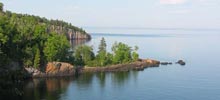Top Five Types who enjoy
Overnight Canoe Tripping as a Favorite Outdoor Recreation
TABLE 3.
Top 5 types |
%#1
or #2 |
ISTP |
31.8% |
ISFJ |
21.9% |
ESTP |
20.0% |
ISTJ |
16.7% |
|
15.0% |
| |
|
Here is a really interesting finding. While Overnight Backpacking trips seemed to be particularly attractive to those who prefer Intuition, Overnight Canoe Tripping strongly attracts those who prefer Sensing, including the two types (ISTP and ESTP) who were least likely to go on an Overnight Backpacking trip.
Another emerging factoid is that compared to Backpacking, Overnight Canoe Trips more strongly appeal to Introverts. The five types *least* likely to enjoy an Overnight Canoe Trip were all Extraverted types.
This difference is interesting because the two experiences share a great deal.
- Each involves camping in the wilderness or semi-wilderness
- Each involves physically active and strenuous daily activity
- Each involves a multi-day commitment to the endeavor
- Each involves living for a time without modern conveniences
- Each involves being subject to vagaries of the weather
- Each involves employing similar gear
Yet there must be subtleties of the two experiences that cause this sharp divide along the Intuition-Sensing scales of perception and of attitude (energy source). As someone who has done and enjoys both canoeing and hiking, I'll hazard some guesses.
From a Sensing perspective, there's a certain tactile pleasure in having a paddle in your hand, sensing the movement against the water, reacting to it and to the canoe. There's an art and grace to this movement . . . yet it is simple, direct, efficient. Then there's the fact that you are "operating" a canoe whereas in hiking and backpacking you aren't operating a vehicle - you are the vehicle! Operating a canoe, keeping it in balance and on course, with varying wind, waves, current and doing it in partnership with another person requires a greater degree of sensory attention than cruising down the trail.
I think the camping part of canoeing can be a bit more sensory rich than the camping part of backpacking. With backpacking, you have to go minimal - after all you can only bring with you what you can carry. With canoeing, it is possible to bring a lot more stuff - on a relative scale. There are canoe trippers who bring folding chairs, bring steaks for the grill, beer coolers, and other enhancements to the camping experience. Some shudder at the thought of eating freeze-dried food, whereas for the backpacker food-in-a-bag is almost essential.
A number of canoe trippers favor pushing hard on the first day or two of the trip in order to set up a base camp to enjoy for a few days. Compared to a backpacking overnight camp, this allows for allot more putzing around the camp, getting it set up for maximal convenience, creating a little homesite for a short period of time. I submit this feathering and enjoying the campsite nest appeals to both the Sensing and Introverted natures more than it does the Intuitive and Extraverted sides of personality.
While backpacking trips often on purpose seek the highest point on the landscape as a destination to enjoy a scenic overlook, canoe trippers follow portage trails that attempt to traverse as low in elevation as possible. [Whenever I've been forced by circumstances to portage over a high hill, the last thing on my mind when I get to the zenith with a canoe on my shoulders or a heavy pack on my back is stopping for a scenic view!]
Fishing often accompany's canoeing - which provides another set of sensory experiences and demands. And for the lucky fisher, the catch provides a richer food preparation, cooking and eating experience than what is obtained by the backpacking cousin who is more likely to dine on food-in-a-bag (that my skeptical ISTP wife finally admitted doesn't really taste that bad!).
Canoe tripping and canoeing in general is a more solitary experience, usually done with only one other person, occasionally two or three others and only infrequently (except for scouting or outward bound organizations) in larger groups. While backpacking can also be solitary, it is a bit more feasible to enjoy the experience with a slightly larger group of people. To an extravert, going from 1or 2 other companions to 5 other companions may seem insignificant, but to an introverted preference person that little increase can easily move from pleasurable company to simply too much companionship for too long a period of time.
In our part of the country (upper midwest) the lore of canoeing is filled with sentient pleasures for the introverted personality: listening to the call of the loon at night, watching a beautiful sunset unfold over the water, gliding along on a mirror surface of the lake, smelling the campfire with walleye fillets grilling in the pan, drinking in physically and metaphorically the cool, clean, water. Enjoying these treasures with well chosen companions I suspect is part of the appeal of this experience to ISFJs and INFPs.
Canoe tripping can also involve a degree of risk, encountering the unknown and adventure not necessarily equaled in backpacking. To a degree this risk can be controlled by the choice of route and decisions made while en-route. Yet for the adventurous, it is *easy* to plan into the experience the desired elements. You have rapids, whitewater and waterfalls for the thrill seeker and routes that are largely uncharted appealing to the voyageur-explorer (two components that often appeal to xxSP personalities). While risk and adventure is certainly available in mountain climbing and backpacking, my point here it is much more easily attainable in canoe tripping (and happens regularly by accident!).
|



